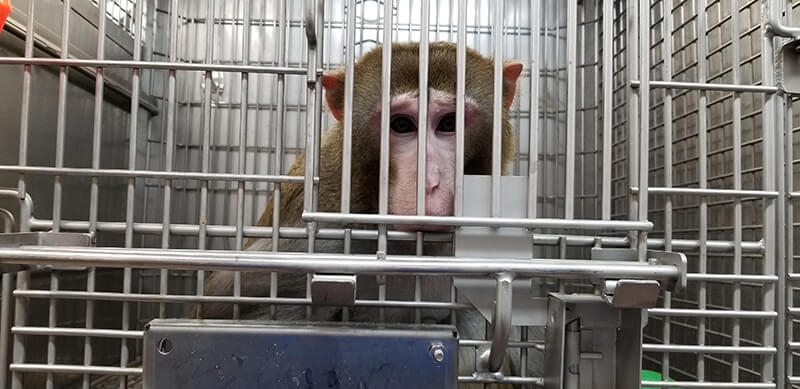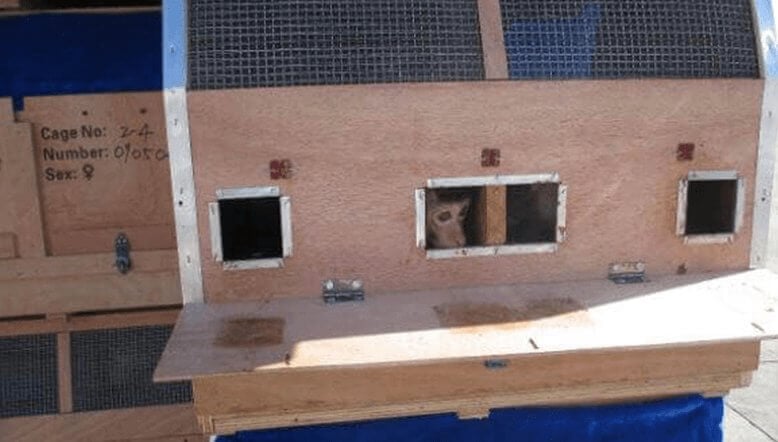PETA Exposes the Monkey-Importation Industry’s Darkest Secrets
The recent revelation that Cambodian officials conspired to import wild-caught monkeys into the U.S. illegally rocked the biomedical experimentation industry—and shook loose many of the dirty secrets of those who profit from this sordid business.
Here’s what monkey experimenters and the dealers who supply their victims have spent decades trying to hide:
1. The cruel forest-to-lab monkey pipeline is not about human health—it’s about profit.
Snatching monkeys from their homes in Asia and funneling them into laboratories around the globe is a billion-dollar industry. But while the wallets of monkey torture apologists grow fatter, the vaccines and other medical advances they keep promising fail to materialize.

An HIV vaccine? We’re still waiting for one—tens of billions of taxpayer dollars and hundreds of thousands of monkeys’ lives later. Substitute “malaria” or “tuberculosis” for “HIV” and the story is the same.
Desperate for a victory, mouthpieces for this violent industry cling to the COVID-19 vaccine—conveniently ignoring that it was fast-tracked to skip as much nonsensical animal experimentation as the law would allow.
In fact, medical breakthroughs like the COVID-19 vaccine—or medical breakthroughs at all—aren’t even a goal for many primate experimenters. They proudly put monkeys to death in pursuit of answers to such vexing questions as “Do monkeys think cartoon shapes have feelings?” and “If we get monkeys drunk, how will it affect their bones?”
They could find the answers by using non-invasive, human-relevant research methods. Instead, they double down on violence, demanding even more primates to kill.
2. The monkey-abduction pipeline is driving macaque species to extinction.
Experimenters’ relentless demand for monkey victims has decimated wild macaque populations, playing a significant role in recently landing two species—long-tailed macaques and southern pig-tailed macaques—on the International Union for Conservation of Nature’s (IUCN) endangered list.
Don’t take it from us—take it from the IUCN itself.
Between 2008 and 2019, 450,000 long-tailed macaques were forced into cramped crates and hauled across international borders for profit. For most of these terrified animals, a dismal laboratory was their final destination—likely in the U.S., which imports more primates for experimentation than any other country.

Almost none of these monkeys will make it out of a laboratory alive.
3. The international monkey trade puts public health in peril.
Kept open by greedy experimenters, the primate-abduction pipeline pours more than just monkeys into countries like the U.S.—it also pours in a plethora of contagious and potentially deadly zoonotic pathogens.
Among the nasty infectious agents that can hitch a ride on monkey shipments are those that cause campylobacter infection, dengue fever, hemorrhagic fevers (like Ebola), herpes B, leprosy, malaria, melioidosis, salmonella infection, shigellosis, and tuberculosis.
The risk to humans is ominously more than hypothetical. In 2022, a truck crashed while carrying monkeys who had recently been imported to the U.S. from Mauritius, and three of the animals—who hadn’t yet been quarantined—escaped and ran loose on a Pennsylvania highway. Another monkey, recently imported to the U.S. from Cambodia, tested positive for melioidosis, which kills up to 50% of the humans it infects and can persist asymptomatically for months or years after the Centers for Disease Control and Prevention’s (CDC) 31-day mandated quarantine period. And when monkeys imported from the Philippines began dropping dead of a form of Ebola at a Reston, Virginia, quarantine facility, it took a mixture of luck and intensive biocontainment for the facility to avert disaster.
Any shipment of monkeys could ignite the next pandemic. Yet monkey dealers and experimenters, desperate not to snuff out the industry that serves them, choose to keep playing with fire.
Help Shut Down This Pipeline of Death and Disease—Take Action Today
Driven by U.S. experimenters’ insatiable demand for vulnerable monkeys and the siren song of more profits, the monkey-importation industry would rather make excuses about serving human health than confess to decimating macaque populations or endangering the public.
The lies must end now.
Click the button below to demand that the CDC shut down the vile monkey-abduction pipeline immediately.

